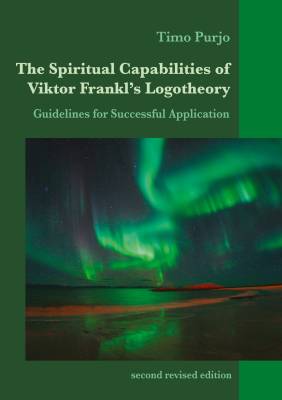The Spiritual Capabilities of Viktor Frankl's Logotheory — Guidelines for Successful Application
Purjo, TimoTuotetiedot
| Nimeke: | The Spiritual Capabilities of Viktor Frankl's Logotheory — Guidelines for Successful Application | ||
| Tekijät: | Purjo, Timo (Kirjoittaja) | ||
| Tuotetunnus: | 9789528011125 | ||
| Tuotemuoto: | Pehmeäkantinen kirja | ||
| Saatavuus: | Toimitusaika 1-3 arkipäivää | ||
| Ilmestymispäivä: | 4.11.2025 | ||
| Hinta: | 48,00 € (42,29 € alv 0 %) | ||
|
|||
| Kust. tuotetunnus: | 21504224 |
| Kustantaja: | BoD - Books on Demand |
| Painos: | 2. painos, 2025 |
| Julkaisuvuosi: | 2025 |
| Kieli: | englanti |
| Sivumäärä: | 319 |
| Tuoteryhmät: | Uutuuskirjat Kaikki tuotteet Tietokirjallisuus |
| Kirjastoluokka: | 17.1 Etiikka. Moraalifilosofia |
| Avainsanat: | Viktor Frankl, Logotherapy and existential analysis, meaning and purpose, values, Spirituality |
This is the second revised edition of Timo Purjo's popular book on human spiritual capabilities, based on Viktor Frankl's philosophical theory, and its applicability to daily life.
In this book, Purjo answers Frankl's call for logotherapists to develop an understanding of logotheory, its application, and integration with other approaches. Besides foundational concepts, including Frankl's three-dimensional ontology, the Ten Theses on the Human Person, an understanding of values, and more, the book introduces philosophical terms from key contemporary thinkers, integrating them into existential-phenomenological philosophy and logotheory.
The author reconstructs and systematically presents logotheory, making it more transparent and more applicable across all helping professions.
The book underscores Frankl's contribution to conceptualizing the spiritual capabilities that allow humans to seek, find, and realize meaningful values. Recognizing that this framework alone offered limited guidance for application, the author developed a structured model of self-distancing and self-transcendence to help people understand and cultivate these essential capacities, providing an applied pathway from basic potentialities to fully realized skills. Since the first edition of the book, five years of systematic testing and implementation have confirmed the effectiveness of these concepts in severe life crises and extreme situations, including war-affected regions.
Purjo's approach is invaluable for hands-on training of emerging logotherapists, working with people's existential challenges such as combat trauma, loss of loved ones, life and work in hazardous conditions, and vulnerable populations in the context of the war. Through this structured framework, logotherapists can effectively tailor their methods to real-life needs.
Readers who have actively used the book have also testified that it unlocks successive layers of knowledge and insight with each reading.
In this book, Purjo answers Frankl's call for logotherapists to develop an understanding of logotheory, its application, and integration with other approaches. Besides foundational concepts, including Frankl's three-dimensional ontology, the Ten Theses on the Human Person, an understanding of values, and more, the book introduces philosophical terms from key contemporary thinkers, integrating them into existential-phenomenological philosophy and logotheory.
The author reconstructs and systematically presents logotheory, making it more transparent and more applicable across all helping professions.
The book underscores Frankl's contribution to conceptualizing the spiritual capabilities that allow humans to seek, find, and realize meaningful values. Recognizing that this framework alone offered limited guidance for application, the author developed a structured model of self-distancing and self-transcendence to help people understand and cultivate these essential capacities, providing an applied pathway from basic potentialities to fully realized skills. Since the first edition of the book, five years of systematic testing and implementation have confirmed the effectiveness of these concepts in severe life crises and extreme situations, including war-affected regions.
Purjo's approach is invaluable for hands-on training of emerging logotherapists, working with people's existential challenges such as combat trauma, loss of loved ones, life and work in hazardous conditions, and vulnerable populations in the context of the war. Through this structured framework, logotherapists can effectively tailor their methods to real-life needs.
Readers who have actively used the book have also testified that it unlocks successive layers of knowledge and insight with each reading.


